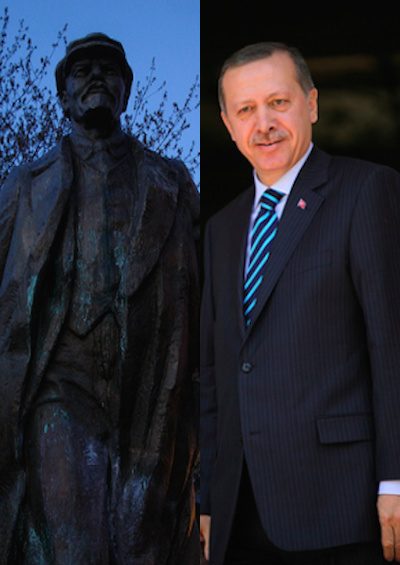In Erdogan’s early days, he was an open Islamist radical, working for an Islamist party that got itself overthrown and banned for being too straightforward.
Later, he reconstituted the Islamist party as the AKP, with its Islamism toned down just enough to fly under the radar screen of the United States and, through U.S. and NATO influence, the military.
In those early days, he took an instrumental view of democracy. In a line that became famous for exposing his intentions, he said, “Democracy is like a train. You take it where you have to go, and then you get off when you arrive at the station you want.”
His line fit in with the Islamist view that God’s law is supreme and the source of legitimacy, while popular sovereignty or democracy is a heresy: elections are to be used, not reverenced as the font of legitimacy.
Nevertheless, Erdogan, like the Muslim Brotherhood in Egypt, learned to go a step past this formula, as he found that democracy could be more useful for Islamism than he had realized.
The people of Turkey were, after all, Islamic by an overwhelming majority. The people’s law could coincide with God’s law — as long as the people were, in the last resort, defined as those who supported God’s law.
Lumping together his enemies
And so Erdogan in power has redefined the people as his supporters, stating that all the domestic opponents of his AKP party are enemies of Turkey. His opponents noted that this meant defining half of the population of Turkey as enemies of Turkey.
This closely parallels the way Lenin defined the supporters of the Bolshevik party as “objectively proletarian,” no matter what their class, and its opponents or critics as “objectively bourgeois” and “enemies of the people.”
Now Erdogan has taken his lumping together of his enemies a step further. In a post-coup speech, at a time when Turkey faced several terrorist incidents, Erdogan said his enemies — the Kurds, the Islamic State, the Gülenists — are all the same terrorist enemy.
Thus again, he conflates what are empirically contrasting opponents. This time he mixes foreign enemies with domestic enemies, and merges groups that are physically at war with each other.
This gives Erdogan the advantage of charging to the moral account of each of them the offenses committed by any and all of them. In calling them all “terrorist,” he justifies any means that he might choose to use against them.
This practice was termed “amalgamationism” — conflating all enemies and all non-adherents — by the Trotskyists, when they were describing Stalin’s practices. Stalin lumped the Trotskyists with the Bukharinists, and indeed with the Nazis.
Categorizing all enemies as “terrorists”
Stalin proceeded to purge all his domestic opponents as “terrorists,” giving the trials themselves amalgamationist titles — e.g., the trial of “The Bloc of Rights and Trotskyites” — and imprisoning and killing 10-20 million citizens as supposedly being in league with them.
The practice began under Lenin, in embryonic form. It flowed from the vision derived from Hegelian concepts, incorporated into Marxist-Leninist ideology of the Leninist Party and its leadership as the “concrete totality” that embodies the realization of all of History’s or God’s intentions.
Further, despite all the contradictions and imperfections of the present, it brings that perfected realization into the present through its own being and its struggle for universal power.
All who oppose that leadership, accordingly, are in league with Satan in opposing God’s historical will and being.
In their innermost self, the opponents cannot help but understand (as John quite logically deduced in his gospel, John 3:19-21) that they are holding aloof from God in order to hold onto their own sinfulness. Thus, they are all in league with one another no matter how superficially different they may be.
Through amalgamationism, Erdogan justifies making total war on all his enemies as “terrorists,” on whatever schedule of priorities his regime might choose based on its own interests, rather than on a basis of priorities vis-à-vis actual terrorism.
The result is a mixing of moralistic ruthlessness with cynical realpolitik. The regime can make alliances with any of its enemies in order to destroy an enemy that the regime finds dangerous to itself at the present time.
This it can do without regard for the consequences for the empirical Turkey; then turn around and do the same on another front.
For now, he has called off his enmity to the Syrian regime in order to strike a blow against the Kurds — the only effective fighters against the Islamic State — all in the name of supposedly fighting the Islamic State.
US playing along
The United States is going along with this, providing military support for Turkey’s intervention. It does this forfear of otherwise losing Turkey as an ally.
We saw this movie play out before in Europe in the interwar years.
America withdrew its power, Germany went totalitarian and Germany made another go at world war and conquest, in the name of paradoxically — a typical paradox of the resentful totalitarians — restoring multipolarism and overturning the underlying Anglo-American unipolarity.
Today the ideological multipolarism mixes, curiously, with an ideological unipolarism of the “End of History” variety.
The sort that promotes democratic ideology everywhere, shorn of support from a unipolarity of power, neglecting realistic appraisal of whether democratization will work, avoiding interested priorities and taking pride in promoting foes equally with friends.
We should not be surprised to see totalitarian democratic forces growing in the upshot. Turkey is only one instance of it: the instance before us today.
By Ira Straus
 Geostrategic Media Political Commentary, Analysis, Security, Defense
Geostrategic Media Political Commentary, Analysis, Security, Defense





